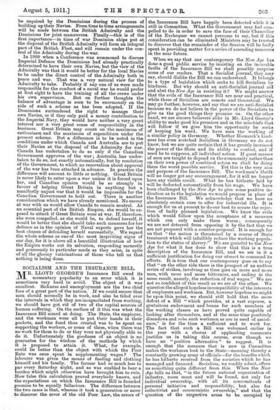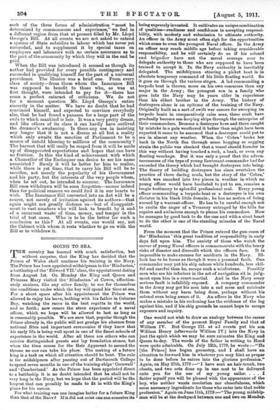SOCIALISM AND THE INSURANCE BILL.
MR. LLOYD GEORGE'S Insurance Bill owed its momentary popularity to an error which it is sometimes very hard to avoid. The object of it was excellent. Sickness and unemployment are the two chief foes of a great part of the nation. If we could secure that men should normally be in work, and also be tided over the intervals in which they are incapacitated from working, we should have got rid of two of the capital sources of human suffering. On the surface of it this was what the Insurance Bill aimed at doing. The State, the employer, and the workman were all to put their hands in their pockets, and the fund thus created was to be spent on supporting the workers, or some of them, when there was no work for them to do or they were not physically able to do it. Unfortunately the goodness of an object is no guarantee for the wisdom of the methods by which it is proposed to attain it. What, for example, could be better than the object with which the Poor Rate was once spent in supplementing wages ? The labourer was given the means of feeding and clothing himself and his family. The farmer had so much less to pay every Saturday night, and so was enabled to bear a burden which might otherwise have brought him to ruin. How false this calculation proved everybody knows, and the expectations on which the Insurance Bill is founded promise to be equally fallacious. The difference between the two cases is that, whereas it took a generation or more to discover the error of the old Poor Law, the errors of the Insurance Bill have happily been detected while it is still in Committee. What the Government may feel com- pelled to do in order to save the face of their Chancellor of the Exchequer we cannot presume to say, but if this consideration can be eliminated Ministers may be trusted to discover that the remainder of the Session will be badly spent in providing matter for a series of amending measures in the near future.
When we say that our contemporary the New Age has done a good public service by insisting on the incurable faults of the Insurance Bill we shall possibly surprise j some of our readers. That a Socialist journal, they may say, should dislike the Bill we can understand. It belongs to a type of legislation which seeks to kill Socialism by kindness. But why should an anti-Socialist journal aid and abet the New Age in resisting it? We might answer that the evils of the Insurance Bill are near and practical, while those of Socialism are remote and theoretical. We may go further, however, and say that we are anti-Socialist because we do not believe in the power of the Socialists to give us the good things they promise us. On the other hand, we axe sincere believers alike in Mr. Lloyd George's ability to make good his.promises and in the mischiefs that will follow if we give him the opportunity he seeks of keeping his word. We have seen the working of a similar policy in Germany. Whether Bismarck's kind- ness has even scotched Socialism in Germany we do not know, but we are quite certain that it has greatly increased the power of the State and its ability to control, and if need be to suppress, all individual action. If great masses of men are taught to depend on the community rather than on their own power of combined action we shall be doing them the worst possible service. Yet this is the very aim and purpose of the Insurance Bill. The workman's thrift will no longer get any encouragement, for it will no longer have any visible result. What he has hitherto laid by will be deducted automatically from his wage. We have been challenged by the New Age to give some positive in- dication as to the legislation we would propose in place of the Insurance Bill. We acknowledge that wo have no absolutely certain cure to offer for industrial ills. It is enough for us at present to do our best to secure the rejec- tion of badly planned legislation. We know the evils which would follow upon theacceptance of a measure which can only make them worse ; consequently we are not deterred from opposing it by the fact that we are not prepared with a counter-proposal. It is enough for us that " the nation is threatened by a course of State treatment which will infallibly reduce the working popula- tion to the status of slavery." We are grateful to the New Age for what it has done to show that this is a true description of the Insurance Bill, and we see in it a sufficient justification for doing our utmost to commend its efforts. It is true that our contemporary goes on to say that " on the other side there is the prospect of an endless series of strikes, involving as time goes on more and more men, with more and more bitterness, and ending in the same result, namely, the reduction of real wages." We are not so confident of this result as we are of the other. We question the alleged hopeless incompatibility of the interests of employers and workmen. But, however hopeless we might be upon this point, we should still hold that the mere defeat of a Bill " which provides, at a vast expense, a gratuitous endowment and bonus for such members of the working classes as have proved quite capable of looking after themselves, and at the same time positively . disendows and robs such workmen as are in need of assist- ance," is for the time a sufficient end to work for. The fact that such a, Bill was welcomed earlier in the year with a chorus of applauding comments justifies us in taking this course, even though we have no " positive alternative " to suggest. It is enough that the measure that is now in Committee makes the workman look to the State—meaning thereby a constantly growing army of officials—for the benefits which he has hitherto received from the societies which he has managed and financed. Socialism, we readily admit, offers us something quite different from this. When the New Age tells us that, " in the future national organization of industry, room must and will be found, not only for individual ownership, with all its concomitants of personal initiative and responsibility, but also for collectivist and communistic ownership," and that the question of the respective areas to be occupied by
each of the three forms of administration "must be determined by commonsense and experience," we feel in a different region from that at present filled by Mr. Lloyd George's Bill. At all events we are not asked to extend a system of State subsidies to labour which has never yet succeeded, and to supplement it by special taxes on employers and labourers with no certain assurance as to the part of the community by which they will in the end be paid.
When the Bill was introduced it seemed as though its author had provided for every possible contingency and succeeded in qualifying himself for the part of a universal providence. The illusion was a brief one. From every class of society—from those whom the Insurance Bill was supposed to benefit to those who, as was at first thought, were intended to pay for it—there has come a perfect cataract of criticisms. We do not for a moment question Mr. Lloyd George's entire sincerity in the matter. We have no doubt that he had convinced himself, and expected to convince everybody else, that he had found a panacea for a large part of the evils to which mankind is heir. It was a very pretty dream, and like others of its class it can hardly have outlived the dreamer's awakening. Is there any use in insisting any longer that it is not a dream at all but a reality which only awaits the sanction of Parliament to be a source of untold blessing to millions of the community ? The harvest that will really be reaped from it will be made up of disappointed expectations and hopes that can have no fruition. Is this the kind of achievement with which a, Chancellor of the Exchequer can desire to see his name associated ? Surely it will be better for him to realize, while there is yet time, that to carry his Bill will be to sacrifice, not merely the popularity of his Government and his party, but the interests of the very people whom, when he set out, he intended to succour. The Insurance Bill once withdrawn will be soon forgotten—sooner indeed than for political reasons we could find it in our hearts to wish. The Insurance Bill converted into an Act will be a source, not merely of irritation against its authors—that again might not greatly distress us—but of disappoint- ment to vast numbers who will look to benefit by it and of a. recurrent waste of time, money, and temper in the trial of test cases. Who is to be the better for such a conclusion as this ? At all events, one would say, not the Cabinet with whom it rests whether to go on with the Bill or to withdraw it.







































 Previous page
Previous page